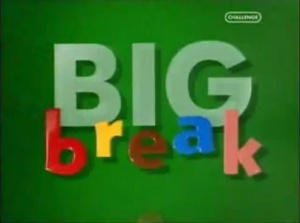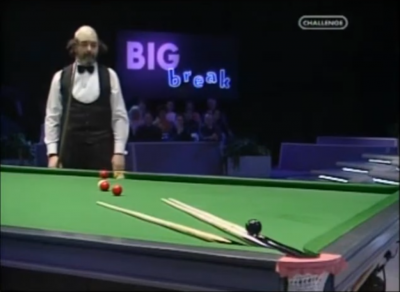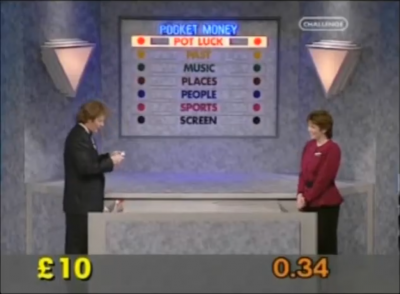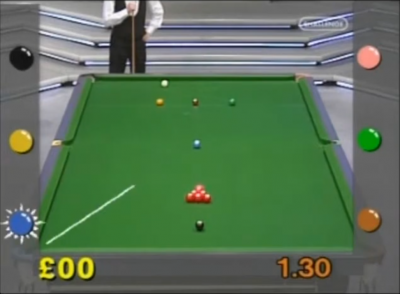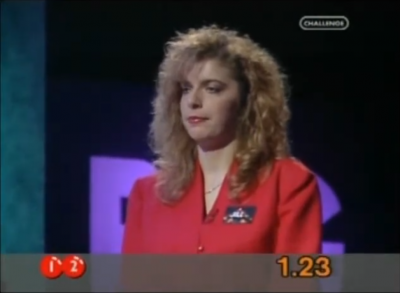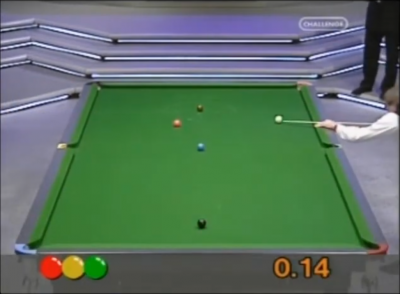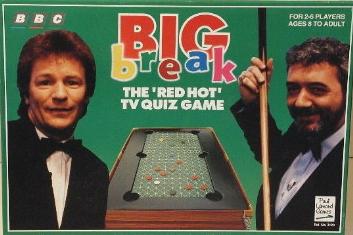Big Break
(→Trivia: Goodness, this is a real mess. At the very least, distinguish between "production" and "broadcast" series.) |
|||
| (39 intermediate revisions not shown) | |||
| Line 11: | Line 11: | ||
== Co-hosts == | == Co-hosts == | ||
| + | Referee:<br> | ||
| + | Len Ganley (non-broadcast pilot)<br> | ||
John Virgo | John Virgo | ||
| - | + | Announcer:<br> | |
| - | Colin Ward Lewis (1991- | + | Philip Talbot (non-broadcast pilot)<br> |
| + | Colin Ward Lewis (1991-96)<br> | ||
Zora Suleman (1997)<br> | Zora Suleman (1997)<br> | ||
[[Charles Nove]] (1998 & 2001) | [[Charles Nove]] (1998 & 2001) | ||
| Line 21: | Line 24: | ||
BBC1, 30 April 1991 to 9 October 2002 (approx. 217 episodes in 14 series + 17 specials) | BBC1, 30 April 1991 to 9 October 2002 (approx. 217 episodes in 14 series + 17 specials) | ||
| + | |||
| + | (see [[#Transmission and Production details|Transmission and Production details]] below) | ||
as ''Stars of the Future'': 27 May 1995 to 11 December 1999 (18 episodes in 3 series) | as ''Stars of the Future'': 27 May 1995 to 11 December 1999 (18 episodes in 3 series) | ||
| Line 28: | Line 33: | ||
== Synopsis == | == Synopsis == | ||
| - | Long-running vehicle for blue-comedian-turned-good [[Jim Davidson]] to lark about and make silly voices. | + | Long-running vehicle for blue-comedian-turned-good [[Jim Davidson]] to lark about and make silly voices alongside snooker player and commentator John Virgo. They both guide three teams through the rounds. Each team is made up of a contestant and a professional snooker player. |
| - | + | ||
| - | + | ||
| - | + | ||
| - | + | ||
===Hot to pot=== | ===Hot to pot=== | ||
| - | + | In the first round, ''Red Hot'', the contestants answer three rather easy questions in order to win time for their snooker playing partner who then has to "pot as many balls as they can" of the ten reds available on the table. The team who scores the least in terms of potted balls leaves the game. | |
<div class="image">[[File:Big Break Pot Luck.png|400px]]''Unlike [[Bullseye]], you DO get something in this game for two in a bed.''</div> | <div class="image">[[File:Big Break Pot Luck.png|400px]]''Unlike [[Bullseye]], you DO get something in this game for two in a bed.''</div> | ||
| Line 68: | Line 69: | ||
===Game over=== | ===Game over=== | ||
| - | The show ended around the same time Davidson's other show, | + | The show ended around the same time Davidson's other show, [[The Generation Game]], did. Perhaps the show was running out of legs, maybe indicating why the BBC tried out [[Full Swing]] in 1996, a golf show in the same vein as ''Big Break'' and produced by the same John Burrowes. Although ''Full Swing'' wasn't recommissioned, nevertheless ''Big Break'' was one of the most popular shows that the BBC had done in the 90s attracting 13.9 million viewers at its peak. |
== Key moments == | == Key moments == | ||
| Line 104: | Line 105: | ||
== Trivia == | == Trivia == | ||
| - | Tony Knowles scored the highest Pocket Money score of £580, which was achieved on 6 April 1996, beating Willie Thorne's record of £540. | + | Tony Knowles scored the highest Pocket Money score of £580, which was achieved on 6 April 1996, beating Willie Thorne's record of £540 and Ronnie O'Sullivan's record of £480 on 26 March 1994. |
===Transmission and Production details=== | ===Transmission and Production details=== | ||
| - | Even though it says at the top of the article "14 series", there were actually 10 production series made. That's because the 1995, 1996, 1997, 1998 and 2001 production series were actually split into 9 broadcast series with later episodes having to wait 2 or 3 years to air. (No series was made in 1999 or 2000.) On top of that, ''Big Break'' moved around a lot in the schedules during its 10 year tenure on the Beeb. To avoid any confusion, here's | + | Even though it says at the top of the article "14 series", there were actually 10 production series made. That's because the 1995, 1996, 1997, 1998 and 2001 production series were actually split into 9 broadcast series with later episodes having to wait 2 or 3 years to air. (No series was made in 1999 or 2000.) On top of that, ''Big Break'' moved around a lot in the schedules during its 10 year tenure on the Beeb. To avoid any confusion, here's an "almost" complete transmission guide, which also includes the five production series that were broadcast in parts. These do not include specials. |
====1990 production==== | ====1990 production==== | ||
| Line 115: | Line 116: | ||
All the episodes aired on Tuesdays at 8.30pm. | All the episodes aired on Tuesdays at 8.30pm. | ||
| + | |||
| + | The first series was commissioned for 14 episodes, but 12 of them actually aired. | ||
====1991 production==== | ====1991 production==== | ||
| Line 120: | Line 123: | ||
* Series 2: 11 January to 4 April 1992 (13 episodes) | * Series 2: 11 January to 4 April 1992 (13 episodes) | ||
| - | The first five episodes aired on Saturdays at 6.40pm after | + | The first five episodes aired on Saturdays at 6.40pm after [[Noel's House Party]]. The last eight episodes swapped time slots with ''Noel's House Party'', which meant that ''Big Break'' now aired at 5.50pm. |
| + | |||
| + | The second series was commissioned for 12 episodes (that includes the 1991 Christmas special), two episodes from the first series were aired as part of the second series on 22 February and 7 March 1992 with the latter being the very first programme ever recorded. | ||
====1992 production==== | ====1992 production==== | ||
| Line 127: | Line 132: | ||
All the episodes aired on Saturdays at 5.50pm. | All the episodes aired on Saturdays at 5.50pm. | ||
| + | |||
| + | This series and the two previous series had the same three snooker players come in and record two shows for the day but they wouldn't be aired one after the other, just in case someone writes in to ''Points of View'' asking if what they were watching was a new episode or a repeat. | ||
====1993 production==== | ====1993 production==== | ||
| Line 132: | Line 139: | ||
* Series 4: 4 September 1993 to 26 March 1994 (27 episodes) | * Series 4: 4 September 1993 to 26 March 1994 (27 episodes) | ||
| - | All the episodes aired on Saturdays after | + | All the episodes aired on Saturdays after [[Noel's House Party]] at various time slots. |
| + | |||
| + | The fourth series was originally commissioned for 18 episodes (that includes the 1993 Christmas special), the show was getting increasingly strong viewership only a few weeks into the series that a further 10 episodes were commissioned and filmed while the current series was airing, which explains why those extended 10 episodes had a lot more purple lighting and Jim growing a mullet. Also during that series, ''Big Break'' was the last show to be recorded with a studio audience in Studio D at BBC Elstree Centre on 16 November 1993 as ''Eastenders'' took over that studio until 2001. | ||
====1994 production==== | ====1994 production==== | ||
| Line 146: | Line 155: | ||
** Broadcast Series 7: 2 March to 19 July 1996 (20 episodes) | ** Broadcast Series 7: 2 March to 19 July 1996 (20 episodes) | ||
| - | The sixth series aired on Saturdays at 7.20pm. The first ten episodes of the seventh series aired on Saturdays at 5.45pm, the last ten episodes aired on Fridays at 8.30pm. | + | The sixth series aired on Saturdays at 7.20pm. The first ten episodes of the seventh series aired on Saturdays at 5.45pm, when [[Full Swing]] took over that slot, the last ten episodes aired on Fridays at 8.30pm. |
====1996 production==== | ====1996 production==== | ||
| Line 167: | Line 176: | ||
====1998 production==== | ====1998 production==== | ||
| - | * Production Series 9: 18 December 1999 to 19 May 2001 ( | + | * Production Series 9: 18 December 1999 to 19 May 2001 (24 episodes) |
| - | ** Broadcast Series 13: 18 December 1999 to 19 May 2001 ( | + | ** Broadcast Series 13: 18 December 1999 to 19 May 2001 (24 episodes) |
| - | The first episode of the thirteenth series aired on Saturday at 6.10pm. Episodes 2- | + | The first episode of the thirteenth series aired on Saturday at 6.10pm. Episodes 2-10 aired on Wednesdays at 7pm (with the exception of Episode 4, which aired on Friday at 7pm). Episodes 11-20 aired in a Monday to Friday daytime slot at 2.55pm just before Children's BBC programming and the last four episodes aired on Saturdays at 6pm. |
====2001 production==== | ====2001 production==== | ||
| - | * Production Series 10: 16 June 2001 to | + | * Production Series 10: 16 June 2001 to 10 August 2002 (13 episodes) |
| - | ** Broadcast Series 14: 16 June 2001 to | + | ** Broadcast Series 14: 16 June 2001 to 10 August 2002 (13 episodes) |
| - | The first | + | The first eight episodes of the fourteenth and final series aired on Saturdays at 6.05pm and the last five episodes aired on Saturdays at 5.35pm. |
| + | |||
| + | Also, the reason we have an "almost" complete guide is that there are five listings that we don't have enough info on to confirm whether they were new episodes, repeats or dropped in favour of something else. These listings are 27 June 1998, 19 January 2000, 29 June 2002, 2 and 9 October 2002. If you have any further info on the five transmission dates we've mentioned to help us on, let us know in the feedback section below. | ||
| + | |||
| + | On the plus side, we do have confirmation on these transmission dates, which were repeats. The transmission on 4 December 1999 was the episode from 8 May 1999. Episodes 11-20 from the 1998 production series were given repeat broadcasts on Saturdays from 13 May to 19 August 2000. The transmission on 11 August 2001 was the episode from 23 June 2001 and the transmission on 17 August 2002 was the episode from 18 August 2001. | ||
== Merchandise == | == Merchandise == | ||
| Line 191: | Line 204: | ||
[http://en.wikipedia.org/wiki/Big_Break Wikipedia entry] | [http://en.wikipedia.org/wiki/Big_Break Wikipedia entry] | ||
| - | == | + | == Videos == |
| - | <div class=" | + | <div class="video"><object width="480" height="385"><param name="movie" value="http://www.youtube.com/v/YwV6ibqIovI?fs=1&hl=en_US"></param><param name="allowFullScreen" value="true"></param><param name="allowscriptaccess" value="always"></param><embed src="http://www.youtube.com/v/YwV6ibqIovI?fs=1&hl=en_US" type="application/x-shockwave-flash" allowscriptaccess="always" allowfullscreen="true" width="480" height="385"></embed></object><br/>''The non-broadcast pilot with [[Mike Reid]]. Gives a whole new meaning to the term "[[Runaround]] now"''</div><br/> |
| - | + | ||
| - | + | ||
| - | + | ||
| - | < | + | |
| - | + | ||
| - | '' | + | |
| - | + | ||
| - | + | ||
<div class="video"><object width="480" height="385"><param name="movie" value="http://www.youtube.com/v/XBVXZTpgVM8?fs=1&hl=en_US"></param><param name="allowFullScreen" value="true"></param><param name="allowscriptaccess" value="always"></param><embed src="http://www.youtube.com/v/XBVXZTpgVM8?fs=1&hl=en_US" type="application/x-shockwave-flash" allowscriptaccess="always" allowfullscreen="true" width="480" height="385"></embed></object><br/>''I'm gonna be snookering you tonight for the very first time on television.''</div> | <div class="video"><object width="480" height="385"><param name="movie" value="http://www.youtube.com/v/XBVXZTpgVM8?fs=1&hl=en_US"></param><param name="allowFullScreen" value="true"></param><param name="allowscriptaccess" value="always"></param><embed src="http://www.youtube.com/v/XBVXZTpgVM8?fs=1&hl=en_US" type="application/x-shockwave-flash" allowscriptaccess="always" allowfullscreen="true" width="480" height="385"></embed></object><br/>''I'm gonna be snookering you tonight for the very first time on television.''</div> | ||
Current revision as of 23:06, 7 November 2024
Contents |
Host
Mike Reid (non-broadcast pilot)
Co-hosts
Referee:
Len Ganley (non-broadcast pilot)
John Virgo
Announcer:
Philip Talbot (non-broadcast pilot)
Colin Ward Lewis (1991-96)
Zora Suleman (1997)
Charles Nove (1998 & 2001)
Broadcast
BBC1, 30 April 1991 to 9 October 2002 (approx. 217 episodes in 14 series + 17 specials)
(see Transmission and Production details below)
as Stars of the Future: 27 May 1995 to 11 December 1999 (18 episodes in 3 series)
Synopsis
Long-running vehicle for blue-comedian-turned-good Jim Davidson to lark about and make silly voices alongside snooker player and commentator John Virgo. They both guide three teams through the rounds. Each team is made up of a contestant and a professional snooker player.
Hot to pot
In the first round, Red Hot, the contestants answer three rather easy questions in order to win time for their snooker playing partner who then has to "pot as many balls as they can" of the ten reds available on the table. The team who scores the least in terms of potted balls leaves the game.
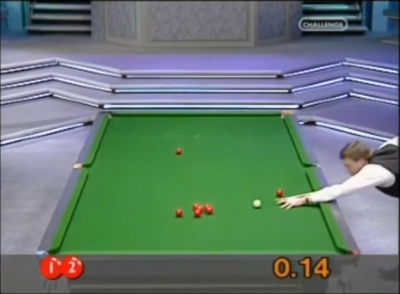 Unlike Bullseye, you DO get something in this game for two in a bed.
Unlike Bullseye, you DO get something in this game for two in a bed.At this point in the show, the leaving contestant gets the chance to perform a trick shot. Set-up by co-presenter and professional snooker player John Virgo, these stunts took a life of their own and a few (mostly awful) shows with purely trick shots were to appear in later years. The contestant would win a consolation prize, in later years usually consisting of a "No Dad" waistcoat (called that by Davidson, as in "No Dad, don't make me wear that")
Pocketing profits
The cleverest round, Pocket Money, involved the skills of the contestant and snooker player rather more. The snooker player would try to make a continuous break, scoring ten times the normal snooker value in pounds (so a potted 7-point black earned 70 pounds). When the player did not pot a ball, or committed a foul, the contestant would have to answer a question. Each ball colour related to a particular category of question (yellow was The Past and so on).
The pockets on the table were coloured with the six snooker colours. If a coloured ball happened to be potted into the correct corresponding pocket, its normal money value would be doubled. For example, the pink usually earned £60 but if it was potted into the pink (top right-hand corner) pocket, it would earn £120. Virgo would often shout out e.g. "Double pink!" to alert players to the possibility of doubling their money. Oh, and he'd quite often deliberately swipe balls into pockets, especially when the players were struggling.
Make or Break
The player earning the most money at this point went on to play Make or Break. The contestant answering up to five questions correctly allowed the snooker player to remove up to five red balls from a six-ball pack of reds. The snooker player would then have the remainder of the 90 seconds (whatever the contestant had not used in the question and answer section) to pot the balls that remained. The normal snooker rules applied, so after potting a red the player had to go for a colour before attempting to pot the coloured balls in sequence.
The best thing about this final round was that the results were often very varied. Sometimes the pro would make a really good start and then spend the last 30 seconds trying to get one ball in. Sometimes the player would be able to win the star prize even though there were three reds still to pot before going on to the coloured balls.
A spin-off series, Big Break: Stars of The Future, featured teenage players and contestants with virtually the same rules (a bit more time here and there, and the kids only keep 10% of their winnings because the rest goes to their school).
Game over
The show ended around the same time Davidson's other show, The Generation Game, did. Perhaps the show was running out of legs, maybe indicating why the BBC tried out Full Swing in 1996, a golf show in the same vein as Big Break and produced by the same John Burrowes. Although Full Swing wasn't recommissioned, nevertheless Big Break was one of the most popular shows that the BBC had done in the 90s attracting 13.9 million viewers at its peak.
Key moments
World Snooker Champion Stephen Hendry scoring not terribly many reds in Round 1.
Jim Davidson's cruel impressions of various snooker players, including Terry Griffiths, Dennis Taylor and Ray Reardon. Mind you, Virgo used to do the same in the past - but probably more affectionately.
Virgo's "it's foolproof" trick shots - oh, and his lively waistcoats as well.
Outtake: Davidson's arrival as Peter Pan on a flying wire in a Christmas special, after being announced by the late Buster Merryfield, best known for playing Uncle Albert in 'Only Fools and Horses', only to promptly crash into the Christmas tree.
John Virgo taking part in the show himself (with Dennis Taylor as referee). After what Virgo described as 'the worst break I have ever seen', he managed to score just 2 in the first round (with the Mission: Impossible music playing over the footage). He then returned to his normal role for the rest of the show.
Catchphrases
"Pot as many balls as you can"
"We ask you to make your break".
"The time will start the next time you strike the cueball".
"Hit it quick!"
Davidson and Virgo used to sign off each show with, respectively: "Say goodnight, JV!" - "Goodnight, JV!"
Inventor
Though credited to Terry Mardell and Mike Kemp by the BBC at the time, a court case in 1998 found that they had effectively stolen the idea from minicab driver Roger Medcalf. The Birmingham Post newspaper reported that the courts awarded Mr Medcalf £100,000 in damages and a one-third share in income generated by the format.
Theme music
The theme music is The Snooker Song, composed by "Mr. Wombles" Mike Batt. It is sung by 1980s pop sensation Captain Sensible. It was originally written for Batt's musical The Hunting of the Snark in which Captain Sensible played the role of the Billiard Marker. Mike Batt also did the theme for Germany's biggest gameshow Wetten Dass...?, dontchaknow.
Trivia
Tony Knowles scored the highest Pocket Money score of £580, which was achieved on 6 April 1996, beating Willie Thorne's record of £540 and Ronnie O'Sullivan's record of £480 on 26 March 1994.
Transmission and Production details
Even though it says at the top of the article "14 series", there were actually 10 production series made. That's because the 1995, 1996, 1997, 1998 and 2001 production series were actually split into 9 broadcast series with later episodes having to wait 2 or 3 years to air. (No series was made in 1999 or 2000.) On top of that, Big Break moved around a lot in the schedules during its 10 year tenure on the Beeb. To avoid any confusion, here's an "almost" complete transmission guide, which also includes the five production series that were broadcast in parts. These do not include specials.
1990 production
- Series 1: 30 April to 16 July 1991 (12 episodes)
All the episodes aired on Tuesdays at 8.30pm.
The first series was commissioned for 14 episodes, but 12 of them actually aired.
1991 production
- Series 2: 11 January to 4 April 1992 (13 episodes)
The first five episodes aired on Saturdays at 6.40pm after Noel's House Party. The last eight episodes swapped time slots with Noel's House Party, which meant that Big Break now aired at 5.50pm.
The second series was commissioned for 12 episodes (that includes the 1991 Christmas special), two episodes from the first series were aired as part of the second series on 22 February and 7 March 1992 with the latter being the very first programme ever recorded.
1992 production
- Series 3: 12 September to 19 December 1992 (15 episodes)
All the episodes aired on Saturdays at 5.50pm.
This series and the two previous series had the same three snooker players come in and record two shows for the day but they wouldn't be aired one after the other, just in case someone writes in to Points of View asking if what they were watching was a new episode or a repeat.
1993 production
- Series 4: 4 September 1993 to 26 March 1994 (27 episodes)
All the episodes aired on Saturdays after Noel's House Party at various time slots.
The fourth series was originally commissioned for 18 episodes (that includes the 1993 Christmas special), the show was getting increasingly strong viewership only a few weeks into the series that a further 10 episodes were commissioned and filmed while the current series was airing, which explains why those extended 10 episodes had a lot more purple lighting and Jim growing a mullet. Also during that series, Big Break was the last show to be recorded with a studio audience in Studio D at BBC Elstree Centre on 16 November 1993 as Eastenders took over that studio until 2001.
1994 production
- Series 5: 9 September 1994 to 20 May 1995 (27 episodes)
The first eight episodes aired on Fridays at 8.30pm. The last 19 episodes moved to Saturdays at 5.45pm.
1995 production
- Production Series 6: 2 September 1995 to 19 July 1996 (27 episodes)
- Broadcast Series 6: 2 September to 14 October 1995 (7 episodes)
- Broadcast Series 7: 2 March to 19 July 1996 (20 episodes)
The sixth series aired on Saturdays at 7.20pm. The first ten episodes of the seventh series aired on Saturdays at 5.45pm, when Full Swing took over that slot, the last ten episodes aired on Fridays at 8.30pm.
1996 production
- Production Series 7: 3 January 1997 to 6 March 1998 (28 episodes)
- Broadcast Series 8: 3 January to 18 April 1997 (15 episodes)
- Broadcast Series 9: 9 June to 14 July 1997 (5 episodes)
- Broadcast Series 10: 9 January to 27 February 1998 (8 episodes)
The eighth series aired on Fridays at 7pm. The ninth series aired on Mondays at 7pm. The tenth series aired on Fridays at 7pm.
1997 production
- Production Series 8: 6 March 1998 to 26 June 1999 (26 episodes)
- Broadcast Series 11: 6 March to 18 July 1998 (11 episodes)
- Broadcast Series 12: 13 February to 26 June 1999 (15 episodes)
The eleventh series aired on Saturdays at 6pm (with the exception of Episode 1, which aired on Friday at 7pm). The twelfth series aired on Saturdays at 6.30pm.
1998 production
- Production Series 9: 18 December 1999 to 19 May 2001 (24 episodes)
- Broadcast Series 13: 18 December 1999 to 19 May 2001 (24 episodes)
The first episode of the thirteenth series aired on Saturday at 6.10pm. Episodes 2-10 aired on Wednesdays at 7pm (with the exception of Episode 4, which aired on Friday at 7pm). Episodes 11-20 aired in a Monday to Friday daytime slot at 2.55pm just before Children's BBC programming and the last four episodes aired on Saturdays at 6pm.
2001 production
- Production Series 10: 16 June 2001 to 10 August 2002 (13 episodes)
- Broadcast Series 14: 16 June 2001 to 10 August 2002 (13 episodes)
The first eight episodes of the fourteenth and final series aired on Saturdays at 6.05pm and the last five episodes aired on Saturdays at 5.35pm.
Also, the reason we have an "almost" complete guide is that there are five listings that we don't have enough info on to confirm whether they were new episodes, repeats or dropped in favour of something else. These listings are 27 June 1998, 19 January 2000, 29 June 2002, 2 and 9 October 2002. If you have any further info on the five transmission dates we've mentioned to help us on, let us know in the feedback section below.
On the plus side, we do have confirmation on these transmission dates, which were repeats. The transmission on 4 December 1999 was the episode from 8 May 1999. Episodes 11-20 from the 1998 production series were given repeat broadcasts on Saturdays from 13 May to 19 August 2000. The transmission on 11 August 2001 was the episode from 23 June 2001 and the transmission on 17 August 2002 was the episode from 18 August 2001.
Merchandise
Unseen Big Break (VHS)
Web links
BBC programme page, which includes a 1998 episode as part of a game show collection.
Videos
I'm gonna be snookering you tonight for the very first time on television.

